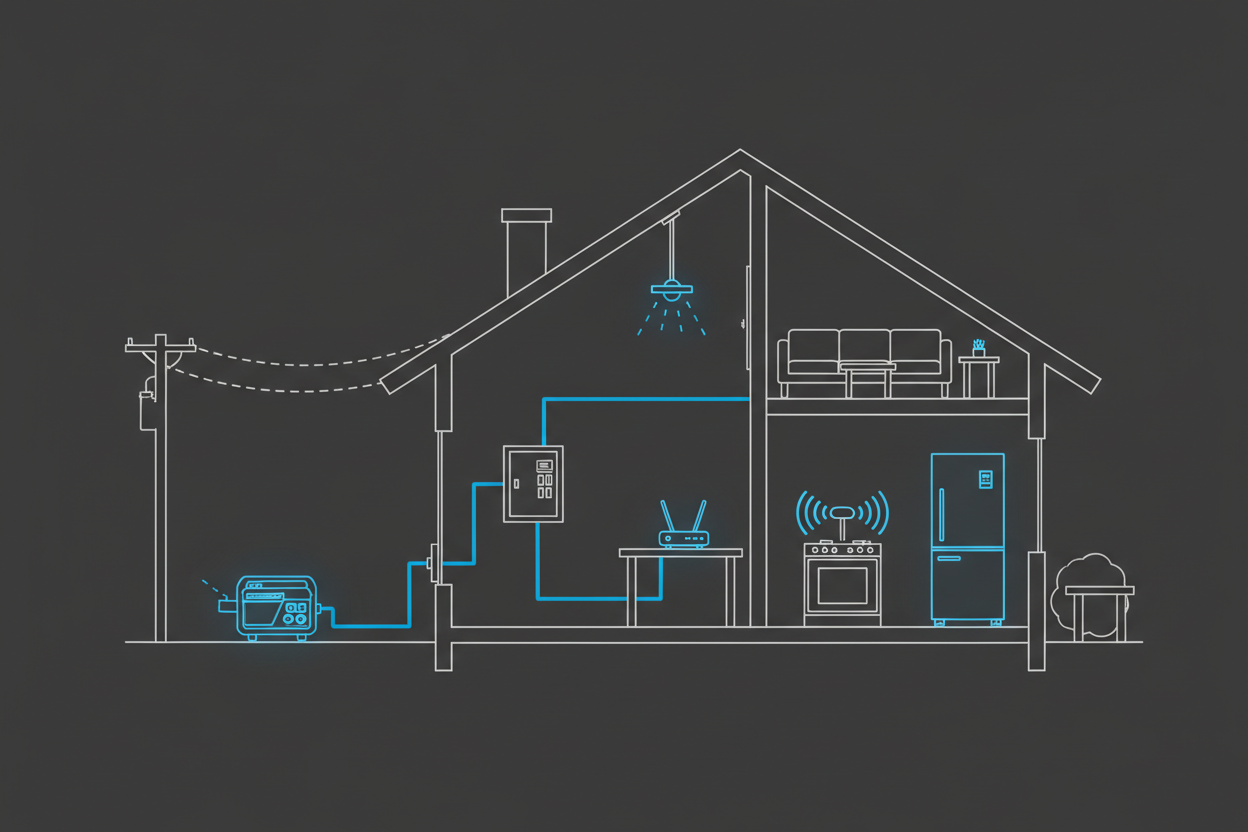Introduction
Power outages are increasingly common across the United States during storms, grid overload, and extreme weather events. For homeowners, having a reliable and quiet backup power source is now essential rather than optional. Inverter generators have become a preferred choice for home backup due to their clean output and low operating noise. They also safely run essential household electronics compared with many conventional portable generators. For a broader technical overview, see our Inverter Generator Guide and Home Backup Generator Guide.
Why Inverter Generators Are Ideal for Home Backup
Home backup power requires stability, reliability, and safe voltage regulation across changing loads. Inverter generators provide:
- clean pure sine wave electricity for sensitive devices
- low THD that protects modern home electronics
- quiet operation suitable for dense neighborhoods
- efficient fuel consumption during extended outages
- stable voltage and frequency for household appliances
These qualities make them superior to many traditional generators during emergencies or planned grid shutdowns.

What Home Appliances Can an Inverter Generator Support?
A properly sized home backup inverter generator can keep critical household circuits and devices running. Typical examples include:
- refrigerator: 400–600W
- Wi-Fi router: 10–20W
- LED lights: 5–15W each
- laptop and chargers: 50–150W
- microwave: 800–1200W
- TV and streaming devices: 80–150W
- coffee maker: 600–900W
- sump pump (varies by home): 700–1500W
A 3500–4500W inverter generator is ideal for most households that want refrigeration, lighting, networking, and light cooking. For sizing principles specific to outages, continue in the Home Backup Generator Guide.
Why Clean Power Matters for Home Appliances
Home electronics such as smart TVs, routers, thermostats, and laptops require clean power to function safely. Inverter generators produce:
- stable voltage for modern switching power supplies
- low harmonic distortion that reduces component stress
- consistent 120V and 60Hz output across changing loads
This combination protects sensitive circuits and ensures stable operation during short and multi-day outages.
Noise Levels Suitable for Residential Neighborhoods
Inverter generators typically operate at relatively low sound levels when placed correctly outdoors. Many models fall into the following range:
- 52–60 dB at medium load in manufacturer sound tests
These levels make inverter units quiet enough for suburban areas, especially during nighttime outages when neighbors may be sleeping.
Fuel Efficiency and Long Runtime
In emergencies, every gallon of fuel matters for household comfort and safety. Inverter generators adjust RPM based on real-time load, resulting in:
- extended runtime for a given tank of fuel
- lower overall fuel consumption across the outage
- reduced heat generation around the engine bay
- smoother operation overnight at partial loads
Many homeowners rely on ECO mode to maximize fuel during outages while powering routers, lights, and refrigerators.
Should You Choose Gasoline or Dual-Fuel?
Gasoline
- higher peak power output per engine size
- easy to refill from local stations when available
- widely accessible in most residential areas
Propane (Dual-fuel Models)
- long storage life with minimal degradation
- cleaner emissions around the generator
- convenient for long-term outage preparedness
Dual-fuel inverter generators offer increased flexibility during emergencies by giving homeowners two independent fuel options.
Home Backup Safety Tips
To safely use an inverter generator at home, follow these core guidelines whenever you run the unit:
- always operate outdoors away from doors and windows
- use a heavy-duty outdoor-rated extension cord
- avoid backfeeding through household wall outlets
- keep the generator dry and sheltered from rain
- store gasoline or propane safely and legally
- check engine oil levels regularly during long runs
Following these practices ensures safe and reliable performance throughout each outage event.
Conclusion
Inverter generators provide dependable, quiet, and clean backup power for homes during storms and grid failures. They protect sensitive electronics, offer long runtime, and operate quietly enough for residential neighborhoods. These advantages make inverter generators an essential part of many modern home preparedness plans.
For deeper planning and cross-scenario comparisons, continue through our pillar guides:
- Home Backup Generator Guide for outage planning and load priorities
- Inverter Generator Guide for technical background on inverter technology
- RV Generator Guide for mobile power and travel scenarios
- Camping Generator Guide for outdoor and campsite use cases
